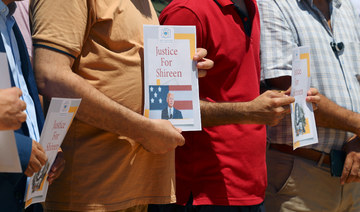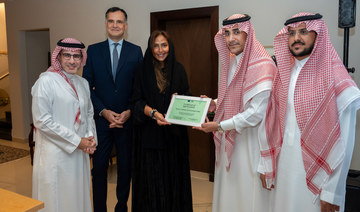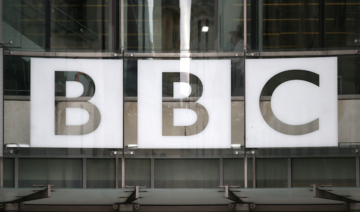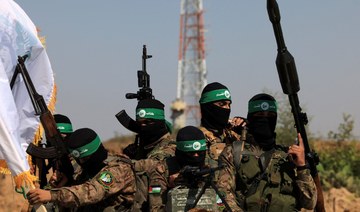TEL AVIV, Israel: Gaza’s militant Hamas rulers issued sweeping new restrictions on journalists after the recent conflict there, but then rescinded them, a group representing foreign media in Israel and the Palestinian territories said Tuesday.
Palestinians who work with foreign journalists were first informed of the new rules earlier this week in messages sent by the Hamas-run Interior Ministry. They were ordered not to report on Gazans killed by misfired Palestinian rockets or the military capabilities of Palestinian armed groups, and were told to blame Israel for the recent escalation.
The Foreign Press Association, which represents international media, including The Associated Press, said the guidelines were rescinded after discussions with authorities in Gaza.
The FPA said in a statement that “such a move would have constituted a severe, unacceptable and unjustifiable restriction on the freedom of the press, as well as the safety of our colleagues in Gaza,“
Salama Marouf, director of the government media office in Gaza, confirmed the reversal. “There are no restrictions,” he said. “We welcome all foreign journalists and media into Gaza and we call on them to come.”
The rules would have gone much further than existing Hamas restrictions. They appeared aimed at imposing the Islamic militant group’s narrative on media coverage of the conflict by implicitly threatening Palestinian reporters and translators who live under its heavy-handed rule.
Even if the rules are officially withdrawn, Hamas has still signaled its expectations, which could have a chilling effect on critical coverage.
In the long-running Israeli-Palestinian conflict, both sides have attempted to impose their narratives and limit negative coverage. Israel, which portrays itself as the only democracy in the Middle East, has a military censor who sometimes imposes gag orders. Israeli authorities also restrict media access to military activities and the country’s nuclear program.
Hamas’ attempt this week to muzzle the foreign media came after it sat out the latest conflict with Israel. The decision to stay on the sidelines likely reflects Hamas’ desire to preserve economic understandings with Israel that have somewhat eased a 15-year blockade imposed by Israel and Egypt after the Hamas takeover.
After a Gaza cease-fire took hold Monday, following three days of fighting between Israel and Hamas’ smaller sister group Islamic Jihad, the Interior Ministry distributed a written copy of the rules to Palestinians applying for entry permits on behalf of foreign media outlets, with instructions to communicate them to the foreign journalists in their “own local way.”
Hamas, which seized power in Gaza in 2007 from rival Palestinian forces, requires all visiting reporters to have a local sponsor — usually a Palestinian journalist or translator hired by the news outlet.
Under the now rescinded restrictions, sponsors were told they must accompany the journalists during their reporting and will be held responsible for what they produce. The sponsors were warned that they must “demonstrate national spirit, defend the Palestinian narrative and reject the foreigner’s bias to the Israeli narrative.”
They would have also been required to inform Hamas of “any suspicious behavior or illogical questions” outside the scope of journalistic work, and to submit a full report to Hamas of what the journalists did in Gaza, in addition to links to all published works.
The guidelines appeared to suggest that writing about forbidden topics like the rocket misfires — or about the media guidelines themselves — could have led to the revocation of local sponsorship. For a Palestinian journalist in Gaza, that would have meant the loss of vital income in a blockaded territory where unemployment hovers around 50 percent.
In many respects, Gaza became a much safer place for reporters after the Hamas takeover, when the group imposed order and put an end to kidnappings and factional violence. But as Hamas consolidated control — and went on to fight four wars and countless smaller battles with Israel — it steadily imposed more and more restrictions on media.
In recent years, Hamas has required journalists to apply for advance approval to film in certain locations, such as the Gaza fishing port, the beach and the gold market.
Hamas has also barred Palestinians from working for Israeli media or providing services to them. Palestinians are also barred from giving interviews to Israeli outlets.
Hamas issues, then rescinds, sweeping rules on Gaza coverage
https://arab.news/g8ude
Hamas issues, then rescinds, sweeping rules on Gaza coverage

- The Foreign Press Association, which represents international media, including The Associated Press, said the guidelines were rescinded after discussions with authorities in Gaza
BBC investigation leads to arrest of one of world’s most notorious people smugglers

- Barzan Majeed, nicknamed ‘Scorpion,’ is caught in Iraqi Kurdistan days after release of BBC podcast series by journalists who tracked him down and interviewed him
- Senior local official confirms officials used information from the broadcaster’s investigation to help find fugitive believed to have helped smuggle thousands of people to UK
DUBAI: Kurdish security forces arrested Barzan Majeed, described as one of the world’s most notorious people smugglers, in Iraqi Kurdistan on Sunday morning.
Nicknamed “Scorpion,” the fugitive is believed to have been involved in smuggling an estimated 10,000 people across the English Channel to the UK. He was arrested days after the release of a BBC podcast series in which investigative journalists tracked him down to the city of Sulaymaniyah in Iraq and interviewed him there.
During the interview, Majeed said he had lost count of the number of people he helped to smuggle, adding: “Maybe a thousand, maybe 10,000. I don’t know, I didn’t count.”
He admitted that between 2016 and 2019 he was one of two people who helped run a people-smuggling operation in Belgium and France but denied he was the mastermind of the operation.
“A couple of people, when they get arrested, they say, ‘We’re working for him’ — they want to get less (of a) sentence,” he said.
Originally from Iraq, Majeed moved to the city of Nottingham, in England, in 2013 but was deported two years later. He had been on the run since failing to appear at a court in Belgium for a sentencing hearing in November 2022.
The UK’s National Crime Agency issued a warrant for his arrest that same year. The agency, which confirmed his arrest, said: “We are grateful to the BBC for highlighting his case and remain determined to do all we can to disrupt and dismantle the criminal networks involved in smuggling people to the UK, wherever they operate.”
A senior member of the Kurdistan Regional Government confirmed its officials had used information from the BBC investigation to locate and arrest Majeed.
Each year, thousands of people flee Iraq, including its Kurdistan Region, in the hope of finding a better life in the UK or other parts of Europe. In many cases, they pay people smugglers to transport them, but the routes and methods used by the smugglers are often dangerous and the migrants face harsh weather and potentially deadly travel conditions.
Germany deported 222 Iraqi citizens in the first three months of this year as part of an alleged agreement between Berlin and Baghdad to deport migrants who do not qualify to remain in Germany, media organization Rudaw, which is based in Iraqi Kurdistan, reported this week.
Saudi radio station MBC FM marks 30 years of broadcasting with special events

- Bosses say the celebrations honor the pioneering station’s enduring contributions to the media landscape in the Kingdom
- ‘MBC FM has captured the ears and hearts of millions of Saudis over 3 decades’ and ‘continues to lead the radio airwaves with the love and loyalty of listeners,’ says group’s chairperson
LONDON: As pioneering Saudi radio station MBC FM celebrates three decades of broadcasting in the Kingdom, it is marking the milestone with a series of events and initiatives at the MBC Group headquarters in Riyadh under the theme “30 and Still Going Strong.”
The celebrations, which began on May 12, honor the station’s enduring contributions to Saudi Arabia’s media landscape, bosses said. They include competitions, entertainment events and exclusive interviews with renowned artists and stars from across the Gulf region and the wider Arab world.
“Just as MBC FM has captured the ears and hearts of millions of Saudis over three decades, being the first commercial FM radio station in the Kingdom, the radio and music sector at MBC Group today continues to lead the radio airwaves with the love and loyalty of listeners,” said Walid Al-Ibrahim, the chairperson of MBC Group.
In addition to providing entertainment for listeners, the station has served as a launchpad for emerging talent, he added, as he highlighted its influence on local culture.
Ziad Hamza, general manager of the radio and music Sector at MBC Group, said the station remains committed to its ongoing evolution while also honoring its strong history and legacy. In particular he highlighted investments in infrastructure, diversity of content and audience engagement as the station adapted to changing tastes and preferences among listeners.
“We have worked on developing the infrastructure and creating a comprehensive modern environment for the radio sector … by investing in Saudi youth talents, including radio presenters, producers, programmers and technicians,” said Hamza.
“We have also launched the MoodMBC application, which includes MBC FM, Panorama FM and MBC Podcast, in addition to enhanced options for direct communication, as well as rich and diverse content catering to poetry lovers, music session enthusiasts, and current affairs followers.
“Our goal has always been to strike a balance between the tastes of listeners and the needs of advertisers, facilitating our clients’ access to various target audience segments around the clock.”
Gulf news agencies discuss fake news, joint media strategy

- Meeting discussed plans for a collaborative media strategy for 2023-30
RIYADH: The threat of fake news and a program for personnel exchanges were among the topics discussed at the 23rd meeting of the heads of the news agencies of Gulf Cooperation Council countries on Monday.
The talks, held virtually, were chaired by Ahmed bin Saeed Al-Rumaihi, director-general of the Qatar News Agency, the Saudi Press Agency reported.
The meeting also discussed the decisions made during the 26th gathering of GCC Ministers of Media, most notably the plans for a collaborative media strategy for 2023-30.
The delegates stressed the need for more training courses and workshops and looked into a report about misleading and false news reports. The meeting also outlined plans for an upcoming photography exhibition.
The attendees approved a program for exchange visits between editors, photographers and technicians across the region, and expressed their support for the Bahrain News Agency’s coverage of the 33rd Arab Summit on Thursday.
Saudia Airlines to bring AlUla FM onboard in new strategic partnership

- Initiative aims to raise awareness and appreciation of AlUla’s rich cultural heritage, company says
LONDON: Saudia Airlines announced it is brining AlUla FM radio to its onboard entertainment as part of a strategic partnership with the Royal Commission for AlUla.
Announced on Monday, the new initiative aims to raise “awareness and appreciation of AlUla’s rich cultural heritage among passengers and those intrigued by Saudi Arabia’s offerings,” the companies said in a statement.
“AlUla’s rich stories and deep cultural legacy are taking flight with Saudia,” said Abdulrahman Altrairi, chief communications and PR officer, and official spokesperson for the RCU during a presentation with Khaled Tash, Saudia’s group chief marketing officer.
“Our new agreement promotes cultural heritage, RCU partnership network and invites new audiences to join in the expansion of AlUla as a global destination and AlUla FM as an audio platform.”
The Saudi national carrier said that AlUla FM is now accessible on all flights through the airline’s “Beyond” inflight entertainment system, in what the radio described as a major advancement in its evolution as an audio platform.
Since its official launch in 2020 under the banner “The Sound of Arabia,” AlUla FM has served as a platform for the promotion of AlUla, broadcasting local narratives to an international audience through regular and seasonal shows and programs.
British foreign secretary renews call for BBC to label Hamas as terrorists

- David Cameron says BBC should ‘ask itself again’ how it labels Hamas after death of British-Israeli hostage
- BBC defends its editorial position citing concerns over impartiality
LONDON: British Foreign Secretary David Cameron reiterated his appeal to the BBC to designate Hamas as a terrorist organization following the death of a British-Israeli hostage.
The national broadcaster has maintained a clear stance since the beginning of the conflict, referring to the Palestinian group as “fighters,” “militants,” or a proscribed terrorist organization in its coverage.
This decision has sparked a nationwide debate, with some experts and politicians accusing the corporation of avoiding an accurate portrayal of the Islamist group, which is holding Israeli hostages.
Speaking to the BBC’s Laura Kuenssberg on Sunday, Lord Cameron urged the organization to reconsider how it labels Hamas and reassess its editorial policy.
The foreign secretary said: “Like everyone else, I watched the video on Twitter, X, last night, put out by Hamas of Nadav (Popplewell) answering a question as to who he was. And I watched that video and you just think, what callous people they are to do that, to play with the family’s emotions in that way.”
He added: “And when you see what Hamas are prepared to do, you just realise the terrible, dreadful, inhuman people, frankly, that we are dealing with.
“Maybe it’s a moment actually for the BBC to ask itself again, shall we describe these people as terrorists? They are terrorists.”
The BBC has resisted calls from the government to classify Hamas as a terrorist organization, fearing it could compromise its impartiality in the conflict.
Last October, Deborah Turness, chief of BBC News, explained the network’s decision not to label any group as terrorists, stating that such terminology is often politicized and weaponized in conflicts.
Hamas announced on Saturday that Nadav Popplewell had died from injuries sustained in an Israeli airstrike a month earlier, and released a video in which he appeared with a black eye and provided personal details.
Popplewell was abducted with his mother from her home in the Nirim kibbutz during Hamas’s incursion into southern Israel on Oct. 7, according to the Israeli Hostages and Missing Families Forum. His brother was killed, while his mother was released during a temporary ceasefire in November.
Cameron said that there were no updates on the fate of Nadav Popplewell as the Foreign Office continues to investigate the situation.




















